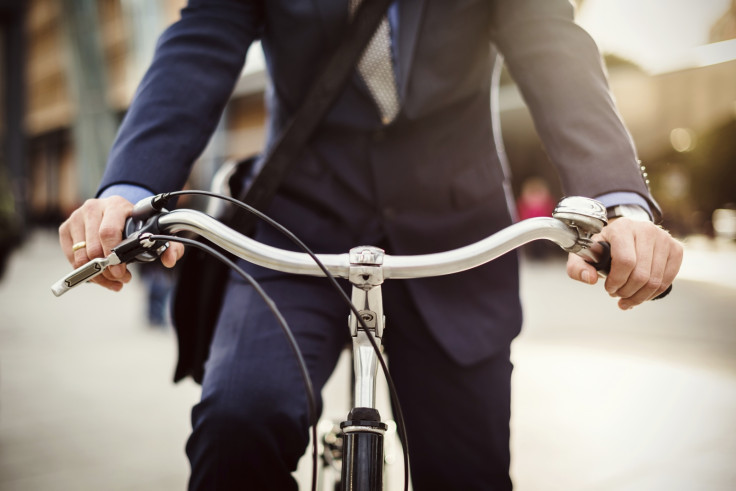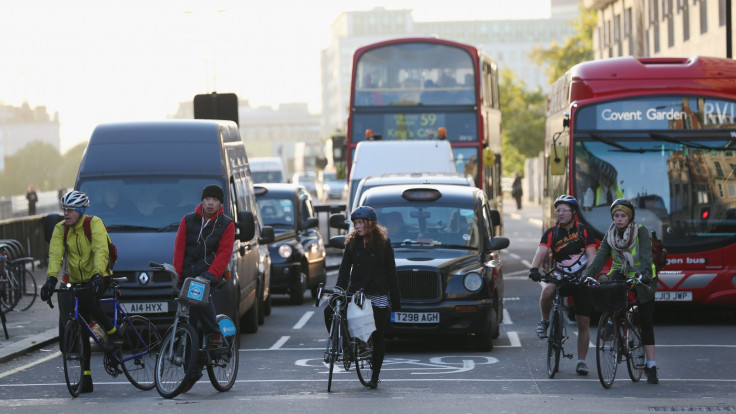Cycle to Work Day: 10 reasons to take up cycling and road safety tips

Nearly 800,000 people in the UK are reaping the rewards of commuting to work by bicycle regularly – a number which continues to grow. From the benefits of getting regular exercise and fresh air (a study has found that passengers in buses and cars inhale more pollution than cyclists) to saving money on transport, cycling is becoming an increasingly popular way to travel in the city. Here are some of the reasons to get on your bike for Cycle to Work Day.
Faster
Research by car manufacturer Citroen found the average speed of a car in London during rush-hour is just 7mph – around half of the average speed of a cyclist on busy roads. While motorists are stuck in traffic, cyclists can travel between 12 and 14mph.
Heart health
Two of the best ways to build cardiovascular fitness is to run for at least 150 minutes a week or cycling to work a few days a week. A study published earlier in 2015 in Medicine & Science in Sports & Exercise found that even pedalling for just five to 10 minutes on a regular basis can help keep your heart healthy.
Save money
Once you have splashed out on a good bicycle and essential accessories such as a helmet and high-visibility clothing, the money you would normally spend on petrol, the train or the bus can go towards something far more rewarding than travelling to work – such as a holiday. An excellent incentive to get cycling.
Sleep better
Exercising helps you to get a better night's sleep – but cycling is especially good at helping combat sleepless nights. Over the course of 35 years, researchers at the University of Georgia analysed the health habits of more than 8,000 men and women aged between 20 and 85. They found that when participants became less fit over time, they had more trouble getting a restful sleep. Exactly how physical activity helps tackle insomnia is as yet unknown, but researchers suggest it might help calm anxiety – a key cause of sleeplessness.

Workout for the brain
Illinois University researchers found that improving cardio-respiratory fitness from five percent led to an improvement of 15% in mental tests. According to the study, cycling helps build new brain cells in the hippocampus, the brain region responsible for memory.
Save the planet
Not only will you be avoiding pollution, but cycling is far greener than driving or taking public transport. Cycling to work for just a few days a week is a great way to reduce your carbon footprint.
Avoid pollution
Air pollution causes around 29,000 premature deaths each year. But surprisingly, a study by the Healthy Air Campaign (conducted with King's College London and Camden Council) have found that people who travel by car experience five-times higher pollution levels than those who cycle.
Easy to get fit
One of the best things about cycling to work is that it takes no time out of your day. You may find you get to work more quickly by avoiding traffic and may be able to dedicate less time to the gym.
Burn more fat
According to the NHS, someone who weights around 12st 9Ib (80kg) will burn more than 650 calories with an hour's riding, which also tones up the legs and bottom. You will also work your upper body if you cycle off-road or uphill.
Be happy
Cycling is good for your well-being, as being physically fit and healthy can also help boost mental health. Exercise is known to be good for beating anxiety and stress.
Safety tips for city cycling
Transport for London has cycling tips aimed for those commuting in the capital:
- Wear a helmet
- Stop at red lights. Don't ride through red traffic lights. You may be fined £50
- Stay central on narrow roads. Try to ride away from the gutter. If the road is too narrow for vehicles to pass you safely, it might be safer to ride towards the middle of the lane to prevent dangerous overtaking by other vehicles
- Stay away from parked cars. Ideally, keep a door's width away in case the door opens suddenly. Also, try to ride in a straight line past parked cars rather than dodging between them
- Stay back from HGVs. Lorries and other large vehicles might not be able to see you clearly, so stay well back behind them
- Always pay attention. Stay focused on what's going on around you so you can see what other road users might do
- Make eye contact. Try to make eye contact with drivers so you're sure that they have seen you
- Don't pavement cycle. Don't cycle on the pavement or up a one-way street (unless clearly marked for cyclists)
- Wear bright clothes. Stay safe by wearing bright clothes during the day and reflective clothing and accessories at night
- Night lights. Use lights after dark – white at the front and red at the rear. You may be fined £50 if you don't have them
- Signal. Use appropriate hand signals to indicate that you're turning left or right
© Copyright IBTimes 2025. All rights reserved.



















